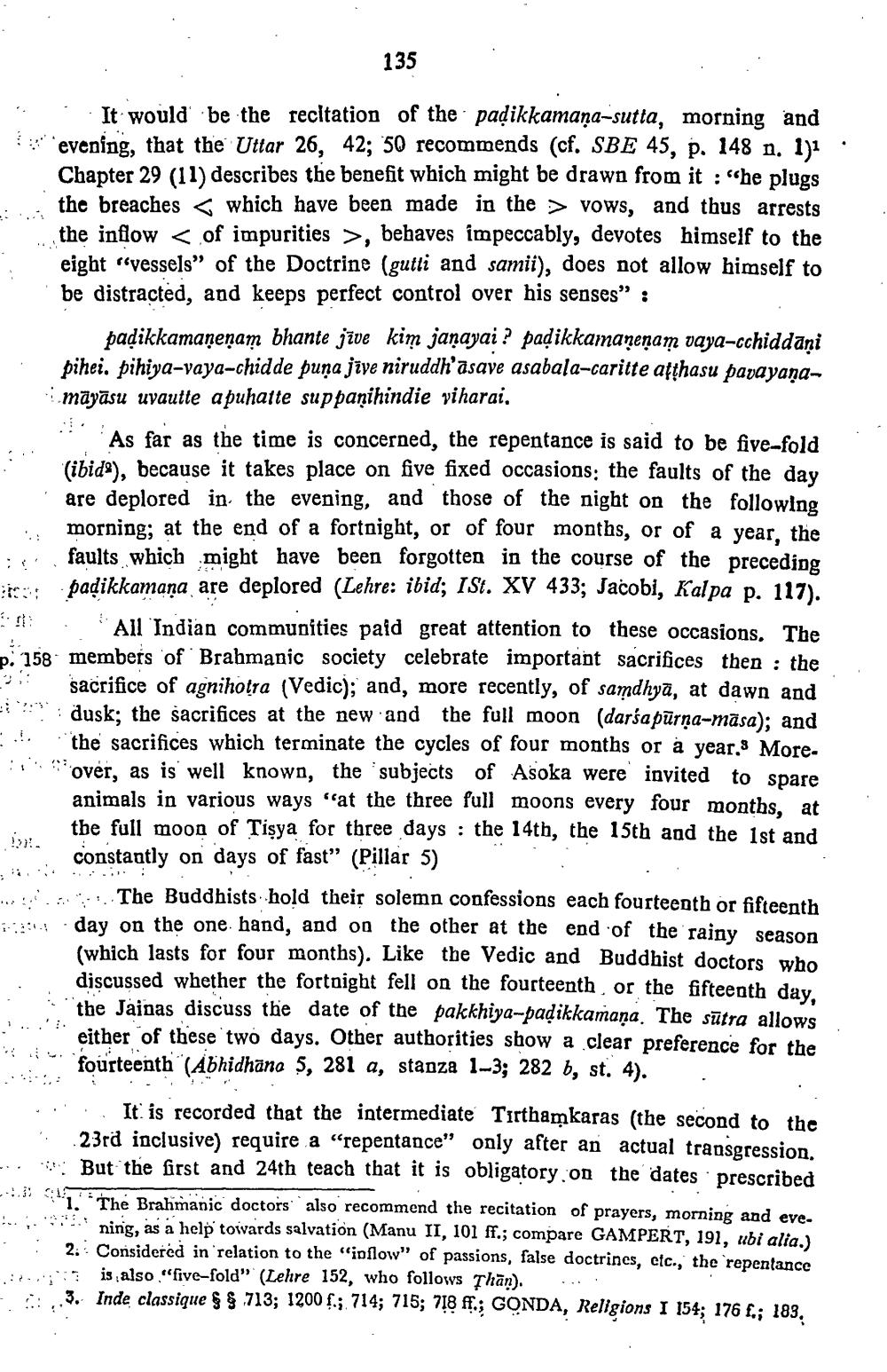________________
135
It would be the recitation of the padikkamaņa-sutta, morning and evening, that the Uttar 26, 42; 50 recommends (cf. SBE 45, p. 148 n. 131 : Chapter 29 (11) describes the benefit which might be drawn from it : "he plugs
the breaches < which have been made in the :> vows, and thus arrests ..the inflow < of impurities >, behaves impeccably, devotes himself to the
eight rovessels" of the Doctrine (gutti and samii), does not allow himself to be distracted, and keeps perfect control over his senses" :
padikkamaņeņam bhante jāve kim jaņayai ? padikkamaneņam vaya-cchiddani pihei, pihiya-vaya-chidde puna jive niruddh’āsave asabala-caritte atthasu pavayanamāyāsu uvautte a puhatte suppaņihindie viharai. * As far as the time is concerned, the repentance is said to be five-fold (ibid), because it takes place on five fixed occasions: the faults of the day are deplored in the evening, and those of the night on the following
morning: at the end of a fortnight, or of four months, or of a vear the 's morning at the end of i faults which might have been forgotten in the course of the preceding I padikkamana are deplored (Lehre: ibid; ISt. XV 433; Jacobi, Kalpa p. 117). 11 . All Indian communities paid great attention to these occasions. The p. 158 members of Brahmanic society celebrate important sacrifices then : the -2 sacrifice of agnihotra (Vedic); and, more recently, of samdhyā, at dawn and -?:":dusk; the sacrifices at the new and the full moon (darśa pūrņa-māsa); and
!. the sacrifices which terminate the cycles of four months or a year. More. L o ver, as is well known, the subjects of Asoka were invited to spare
animals in various ways "at the three full moons every four months, at the full moon of Tisya for three days : the 14th, the 15th and the 1st and
constantly on days of fast” (Pillar 5) I . The Buddhists hold their solemn confessions each fourteenth or fifteenth
day on the one hand, and on the other at the end of the rainy season (which lasts for four months). Like the Vedic and Buddhist doctors who
discussed whether the fortnight fell on the fourteenth, or the fifteenth day. . ''the Jainas discuss the date of the pakkhiya-padikkamaņa. The sūtra allows
either of these two days. Other authorities show a clear preference for the fourteenth" (Abhidhane 5, 281 a, stanza 1-3; 282 b, st. 4).
... It is recorded that the intermediate Tirthamkaras (the second to the
23rd inclusive) require a “repentance" only after an actual transgression. -.. But the first and 24th teach that it is obligatory on the dates prescribed -1.8 41. The Brahmanic doctors also recommend the recitation of prayers, morning and eve. .... .. ning, as a help towards salvation (Manu II, 101 ff.; compare GAMPERT, 191, ubi alia.)
2. Considered in relation to the "ipflow" of passions, false doctrines, etc., the repentance :.. is also "five-fold" (Lehre 152, who follows Thân). . ..3. Inde classique & $ 713; 1200 f.; 714; 715; 718 ff.; GONDA, Religions I 154; 176 £.; 183.
HOWS Than.
...
.




